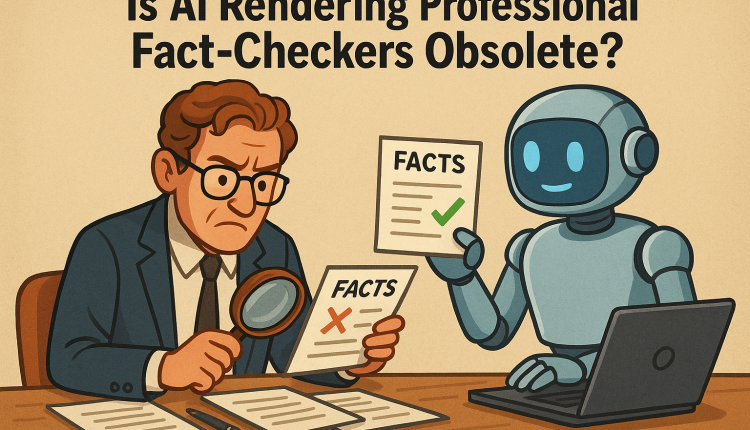The act of verifying images, claims, and providing truth about widely spread ‘fake’ narratives is otherwise known as fact-checking in the media. In today’s journalism world, the work is significant due to the numerous pieces of false information that plague society with deception. Herein emerges the need for professionals specialising in disarming falsehoods, commonly known as fact-checkers.
Professional fact-checkers often digitally dispel false narratives before they gain widespread recognition.
In Nigeria, where untrue narratives can quickly gain traction and ‘mastery’ over the truth, their efforts may not be entirely rewarded, yet they are necessary.
Especially during the election period, information disorder reigns supreme, but professional fact-checking organisations, such as Dubawa, FactCheckHub, and RoundCheck, among others, have been at the forefront of fighting back. Other major newsrooms with fact-checking desks, including PIJAlance, have also joined this fight against digital deception.
However, quite recently, the rise of Artificial Intelligence (AI) tools rolled out by some tech giants worldwide has put fact-checking activities in a thoughtful seat. Probably a time for reflection on whether those tools have come to replace fact-checkers or amplify their work.
Just last week, Elon Musk, X’s (formerly Twitter) CEO, who is leading a liberal charge against digital censorship and utilising every tech tool in his arsenal, announced a significant change.
The platform’s Community Notes, which already fact-checks most untrue claims, is expanding. A new model will include AI Note Writers. Third parties develop these bots and can propose notes on misleading posts.
Grok AI is also present, helping Community Notes to identify and remove false posts once users tag them in any posts they want to verify. On the side, while preparing the final part of this article yesterday, Musk announced that Baby Grok AI will also be created.
Meanwhile, the AI Note Writers will use language models or custom algorithms to analyse a post, detect possible misinformation, and suggest a note to clarify, correct, or add context.
Unlike human contributions previously made through Community Notes, AI-generated notes must still be reviewed and approved by human contributors. It will also be marked as being written by bots, ensuring transparency and accountability.
“The power of generative AI is democratising the access that people — regular people, not data scientists, not even programmers-are going to have (to) these kinds of technologies,” Míguez Pérez told Poynter.
As brilliant as these innovative developments of Musk’s AI on X are, they pose a significant challenge and change to fact-checking. Meta CEO Mark Zuckerberg has also discontinued the company’s third-party fact-checking program, with promises that it will now be replaced with a model similar to X’s Community Notes.
To a degree, one can say that if Community Notes with AI Note Writers and Grok AI maintain their accuracy in fact-checking and Google’s image verification remains constant, what fact-checkers and the public will be competing over will be more awareness of these tools and how they work.
In the future, this awareness will probably be the only distinguishing feature separating a professional fact-checker from a conscious citizen. But this is what Ruben Míguez Pérez, the Chief Technology Officer of Newtral and other fact‑checking leaders, warned against last year at the International Fact-Checking Network’s conference in Sarajevo.
Pérez specifically said that the democratisation of AI is shifting fact-checking power to anyone with access to those tools, even non-experts. Noting that what used to require data scientists can now be done via simple prompts in ChatGPT.
“The power of generative AI is democratising the access that people — regular people, not data scientists, not even programmers-are going to have (to) these kinds of technologies,” Míguez Pérez told Poynter.
But while professional fact-checkers and fact-checking organisations might feel threatened, the future now belongs to falsehood experts who know how to use these AI tools effectively.
Meanwhile, unlike in previous days when the public was not skilled enough to understand how it works, professional fact-checkers will now compete with technologically savvy individuals who also use the same tools for fact-checking.

 An interaction between an X user and Grok AI.
An interaction between an X user and Grok AI.Fact‑checking must evolve through AI-driven sorting and structured community input, or professionals risk being sidelined by those using the same AI tools more nimbly, Baybars Orsek, Managing Director at Logically Facts, noted in a post published by Tech Policy Press in February 2025.
The Risky Future of Truth in the Hands of AI Fact-Checking Tools and Professional Fact-Checkers
Risk is inextricably ‘draped’ and linked to the concept of uncertainty, and it is a sentiment that some experts have expressed regarding the use of AI-backed fact-checking tools. While some view these tools as efficient, others see them as potential means for mass distortion of truth, warning users to double-check their responses.
Among those leading this narrative are: Simbiat Bakare, the copy editor for Dubawa, a West African independent verification and fact-checking organisation; Felix Simon, who is a postdoctoral research fellow in AI and Digital news and research associate at Oxford Internet Institute (OII); Tommaso Canetta, the deputy director of an Italian fact-checking organisation, Pagella Politica; and Jeff Le, among others.
Two months ago, in an article published by Deutsche Welle (DW), Simon concluded that “AI systems such as Grok, Meta AI or ChatGPT should not be seen as fact-checking tools. While they can be used to that end with some success, it is unclear how well and consistently they perform at this task, especially for edge cases.”
In some cases, this could be true. More reasons Grok AI sometimes requests its users to cross-examine its responses, although OpenAI’s ChatGPT, if prompted correctly, will often boast of its accuracy. This is why Canetta said, “AI chatbots can be useful for straightforward fact checks. But users need to be wary of trusting them entirely.”
The potential risks of AI tools continue to be a false sense of security.
Jeff Le.
However, this reality has been countered by Jeff Le, the Managing Principal at 100 Mile Strategies and a former Deputy Cabinet Secretary for the State of California, United States.
Le, who had led the AI and emerging tech under former Governor Jerry Brown, told PIJAlance in an interview in March 2025 that the potential risks of AI tools, such as Grok AI, Meta AI, Community Notes, Google’s Gemini and Microsoft’s Copilot, continue to be a false sense of security.
“No tool to date,” Le said, “no matter how AI-powered, is 100% right now.” Expressing his opinion, he said, “And my belief is that there are more lurking threats than reliable solutions related to cybersecurity and information exchange. Deepfakes and fake voices, in addition to other areas that are fake or synthetic, represent a huge mis and disinformation vulnerability.”
Le believes that “Journalism is already under-resourced and has fewer tools to deploy at scale. Given these platforms (social media) and their algorithms, there is a psychological piece that cannot be ignored: that people are influenced even if they know it’s false or see something enough to write off all of it altogether.” So Le implied that embracing these AI-powered fact-checking tools is pivotal to the future of truth and fact-checking.
Journalism is already under-resourced and has fewer tools to deploy at scale. Given these platforms (social media) and their algorithms, there is a psychological piece that cannot be ignored: that people are influenced even if they know it’s false or see something enough to write off all of it altogether
Bakare weighed in during an XSpace event organised to mark International Fact-Checking Day in April 2025, highlighting that the possibility of X’s community notes, particularly replacing institutional fact-checking, is high, “but that they can also work hand-in-hand.”
This is particularly true because X’s CEO is prioritising what he describes as “free speech” more than anything else for the users. As a result, he is actively working on any AI-driven tech innovation that can hand everything to the people and render what he often describes as “legacy media” useless. Although this is impossible, with AI advancements, professional fact-checkers may be significantly impacted unless they adapt to the trend, as Bakare put it.
But while professional fact-checkers and fact-checking organisations might feel threatened, the future now belongs to falsehood experts who know how to use these AI tools effectively.
In an article published by FactCheckHub, Bakare said, “Tech giants need to look at the fact that you can’t replace one with the other. It’s okay to empower more voices and it’s okay to empower more communities to share their views, but this cannot be compared to how fact-checking, especially in Africa, has evolved. So you have organisations who, after they do this fact-check, go the extra mile to promote it on social media, to translate it into different languages.”
Although Grok AI has been under experts’ scrutiny for various reasons, including its nearly error-free capability to undress anyone if prompted, Le still believes Grok AI is improving and will function better in the future. He added that “Community Notes has been better than nothing…In the future, Grok AI is likely to continue improving as it gains access to high-quality data, increased computational power, and additional resources. But I cannot see the tool replacing fact-checking in the next year, at least.”
Telemedicine, AI, and the Battle for Medical Truth
One of the remaining challenges for tech giants to address in the use of AI and fact-checking tools is how medical information about individuals is received, processed, and handled.
This is especially important as telemedicine, the practice of using digital communication technologies to deliver clinical healthcare services remotely, without the need for an in-person visit, is gaining rapid attention.
Despite its significant assistance in eliminating distance barriers, today, telemedicine is under attack with the rise of AI, and fact-checkers have been helpful. AI Fact-checking tools may have come a little too late.
For example, the Africa Infodemic Response Alliance (AIRA), supported by the WHO, Africa CDC, UNESCO, UNICEF, and fact-checkers such as Africa Check, Dubawa, PesaCheck, Agence France-Presse, and GhanaFact, launched Viral Facts Africa in late 2020/early 2021 to combat COVID-19 misinformation across Africa. They debunked over 1,300 myths, all bordering on false cures to anti-vaccine narratives.
Moreover, a Nigerian medical doctor, Egemba Chinonso, popularly known as the Aproko Doctor, who utilises social media for public medical awareness, has had his pseudo-personality generated through AI and used to advertise and sell medications digitally.
Although Facebook, most importantly, is working to combat this, the gaps are still present, and “the risks of misinformation and exploitation are real!” Dr Stephanie Rosado, a researcher, told PIJAlance during an interview in March 2025.
Dr Rosado, who describes herself as an ‘osteoarthritic warrior,’ says, “This is especially true for individuals from marginalised groups who already face healthcare disparities. They can be especially vulnerable to AI-driven misinformation because when access to healthcare is limited, the spread of bogus treatments through AI can deepen existing inequities.”
Nigeria already has vulnerable communities with limited access to healthcare and qualified medical personnel. Telemedicine will be a valuable innovation if proper mechanisms are implemented, especially by authorities who provide the necessary facilities and by professional fact-checkers or tech giants that provide the right tools and resources to combat health-related digital misinformation for the public.
Dr Rosado puts it specifically like this: “Proponents of AI in healthcare might point to its transformative potential for improving diagnostic testing and supporting personalised treatment plans. But ethical AI use in healthcare must be guided by human expertise, grounded by regulatory oversight, and steeped in equitable values like transparency.”
Tech giants’ AI fact-checking tools have yet to have a designated tool for medical fact-checking. Until ethical and equitable standards, policies, and regulations are in place, AI in medical content requires critical and careful scrutiny, especially when profit motives are involved. Patients deserve accurate, evidence-based information, not AI-generated hype intended to sell products. Until then, the battle for truth in the AI era remains not just technical but profoundly human.
Note: submit tips and opinion articles to pijalance@gmail.com
Join our WhatsApp channel: https://whatsapp.com/channel/0029VaAqC8AGpLHWdULTNq0y


